By Peter Ward July 31, 2015
Fed Hints at Sept. Rate Hike
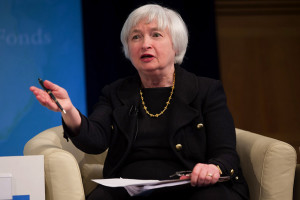
Federal Reserve Chairman Janet Yellen ©International Monetary Fund
After a two-day policy meeting, the Federal Reserve said on Wednesday that the U.S. economy and job market continued to strengthen, possibly paving the way for an interest rate increase when its policymakers meet again in September.
For several months, the Fed has suggested that an interest rate hike is likely in the cards for some time this year. It would be the first rate increase in six years.
During this week’s meeting Fed officials said the economy was “expanding moderately” and praised solid job gains in recent months. “On balance, a range of labor market indicators suggest that underutilization of labor resources has diminished since early this year,” the Fed said in its policy statement. Last month, the Fed was a bit more cautious, saying only that slack in the labor market had “diminished somewhat.”
There was further good news for the U.S. economy on Thursday when a report from The Commerce Department revealed the economy expanded at an annual rate of 2.3% in the second quarter of the year, rebounding from a poor first quarter. The improvement was expected, with Wall Street analysts predicting a slightly higher gain of 2.5%.
China Turbulence Returns
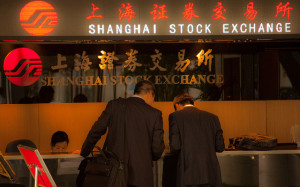
Shanghai Stock Exchange ©Aaron Goodman
After a three-week period of relative calm, Chinese stock markets had another volatile week. On Monday and Tuesday, the Shanghai Composite, the benchmark index for China, tumbled a combined 10.2%. The market recovered on Wednesday, only to see those gains nearly wiped out in Thursday trading.
A two month-long drubbing in Chinese stock markets has erased nearly $4 trillion of market capitalization. In June, the Shanghai Composite hit a high of 5,100 points, a nearly 150% gain over the previous 12 months. Over the next 18 trading sessions, it lost almost 32% of its value.
The Chinese government quickly undertook a number of measures to halt the decline in its stock markets, such as allowing companies to suspend trading, banning major shareholders from selling and giving a state-run financing vehicle $480 billion to support the market. The People’s Bank of China has also cut interest rates to a record low and illegal short sellers were threatened with jail. At one point, more than half of all companies listed on the market suspended trading.
Twitter Bashes…Itself
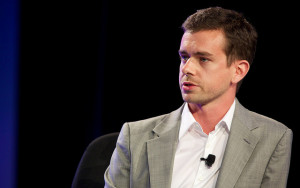
Twitter CEO Jack Dorsey, 2010. ©The DEMO conference, Stephen Brashear Photography
Shares in the social network Twitter plummeted 14.5% on Wednesday after the company’s interim CEO Jack Dorsey admitted on an earnings call that growth in active users has stalled.
“We have not communicated why people should use Twitter nor made it easy for them to understand how to use Twitter,” said Dorsey, the company’s 38-year-old co-founder. “This is unacceptable and we’re not happy about it.”
The company’s quarterly earnings report revealed the number of monthly active users in the U.S. in the second quarter was flat at 66 million, while internationally that figure grew by just 1% to 250 million. Twitter is almost constantly compared to fellow social networking giant Facebook, which boasts 1.4 billion users.
Twitter shares slid to a low for the year of $31.24 on Wednesday. Dorsey and Twitter executives may believe honesty to be the best policy, but their frank admission on the future of the company led an estimated 18 brokerages to cut estimates of the shares’ to as low as $30, the BBC reports.
$40.5 B Pharma Mega-Merger
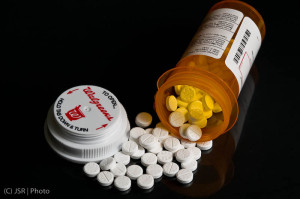
Drugs ©Justin R
The world’s largest generic drugmaker Teva is buying Allergan’s generic pharmaceuticals business for $40.5 billion, the companies announced on Monday. Israeli company Teva will pay Dublin-based Allergan $33.75 billion in cash and $6.75 billion in shares.
The deal could set the tone for more acquisitions and consolidation in the pharmaceuticals industry. Teva executives have been saying for months that large pharma companies should combine in order to save money and become more efficient.
Analysts believe the deal is the largest ever acquisition by an Israeli company, according to The Guardian. Shares in Teva rose 13% in pre-opening trading on the Nasdaq on Monday. Following the acquisition, Teva will now drop its proposed $40 billion-plus acquisition of another pharmaceuticals company, Mylan.
Last year Teva recorded revenue of $20.3 billion, and if this deal goes ahead, could become a company with pro forma revenue of $26 billion in 2016, the New York Times reports. That figure includes sales of $11 billion outside of the U.S.
Allergan has also been a prolific buyer in recent years, and on Sunday announced an agreement to buy drug developer Naurex for $560 million.
Goldman Sachs Hearts Tech
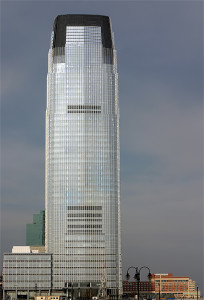
The Goldman Sachs tower on the Hudson River, New Jersey. ©Waldemar Koscielny
Bloomberg took a deep dive into Goldman Sachs’ move into technology investing this week, rolling out an in-depth feature backed by a fascinating series of graphics.
Katrina Brooker’s piece opens at the South by SouthWest festival, a set of film, interactive and music festivals that take place in Austin, Texas each year and which tend to host a lot of tech startups. One company throwing parties at this year’s event stood out from the likes of Spotify, Twitter and Foursquare: Goldman Sachs. An anecdote from a DJ hired to perform at the Goldman Sachs event gives great insight into the clash of cultures between one of the world’s largest banks and technology’s free thinking entrepreneurs.
And yet, the returns are so huge for both sides, they can’t resist jumping into bed together, Brooker writes. For example, Goldman Sachs invested in the ride-hailing app Uber in 2011 when the startup was valued at $500 million. At the end of 2014, the company was valued at $40 billion. Those kind of gains, provided they are eventually realized through an IPO or sale, cannot be matched through traditional investments, she argues.
Goldman Sachs is now a member of the elite band of investors with stakes in 15 or more privately-held startups that have achieved valuations of $1 billion or more. And its investment in technology companies continues to grow – last year the bank participated in 33 deals, and in the first half of this year it participated in 22.
Brooker finds that some entrepreneurs remain wary of Goldman, preferring to work with venture capitalists with experience building their own startups. Some worry that a technology bubble is brewing, but Goldman CEO Lloyd Blankfein is quoted throughout the article lauding the industry and Silicon Valley in particular.
This entry was posted on Friday, July 31st, 2015 at 2:57 pm. It is filed under Week in Review and tagged with China stock market, federal reserve, Goldman Sachs tech investing, interest rate hike, pharmaceutical merger, twitter. You can follow any responses to this entry through the RSS 2.0 feed.
Comments are closed.
